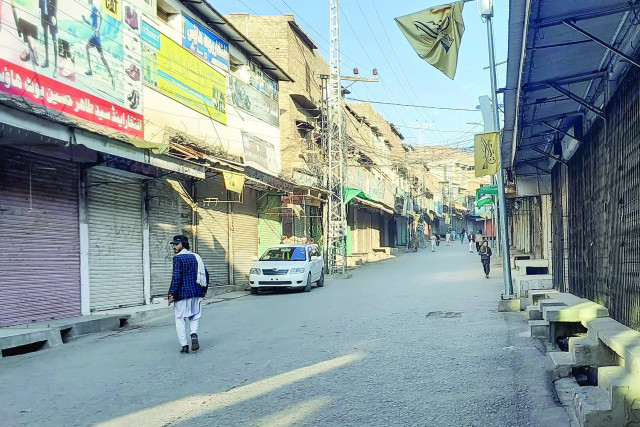Protests over Kurram massacre turn violent
Demonstrators stone ambulances, set pickup on fire

After the massacre of at least 43 of their compatriots shook the tribal district to the core, residents of Kurram held protests across Khyber-Pakhtunkhwa to condemn the brutal attack and demand justice. However, the demonstrations did not conclude without their share of violence.
In Kohat, demonstrators stoned passenger vehicles and ambulances, while also setting a pickup truck on fire, leaving the driver severely injured. Traffic between Kohat and Hangu was disrupted, causing long vehicle queues. Police were deployed to manage the situation.
Protesters offered prayers for the victims and demanded the restoration of law and order from the government and strongly criticised its failure to maintain peace.
Meanwhile, the bodies of the deceased were transported to their ancestral burial grounds after funeral prayers in Parachinar.
The region's atmosphere was filled with grief, with emotional scenes witnessed during the funerals. Following the attack, Parachinar witnessed a complete shutdown of markets and educational institutions as locals protested by burning tyres and blocking roads.
Some angry protestors set fire to two police checkpoints. Community elders appealed for calm.
Over in Bannu, protests were held under the auspices of Majlis Wahdat-e-Muslimeen (MWM) Khyber-Pakhtunkhwa, condemning the massacre in Parachinar.
Protesters, gathered at Imam Bargah Hussainia, chanted slogans against the administration's failure to provide security. MWM leaders criticised authorities, stating that lives and properties were no longer secure, and sectarian tensions were being inflamed. Protesters demanded peace and rejected violence.
In front of the Peshawar Press Club, a large turnout was witnessed, with participants condemning the government.
Prominent figures, including Allama Syed Jamil Hussain, Allama Zakiul Hassan, Allama Ehsanullah Mousavi, and Irshad Bangash led the demonstration.
Protesters decried the atrocities in Parachinar, demanding that the Supreme Court take suo motu notice, conduct a judicial inquiry, and issue a white paper against those responsible.
The demonstrators called for the immediate dismissal of the Khyber-Pakhtunkhwa Chief Minister Ali Amin Gandapur, citing incompetence.
They criticised the provincial government, led by Pakistan Tehreek-e-Insaf (PTI) for 11 years, for failing to provide security to the people.
Protesters highlighted the dire situation in Parachinar, including a severe shortage of food, medicines, fuel, and oxygen, urging the government to open the Afghan border immediately.
Key demands included activating the Parachinar airport due to unsafe roads, and starting a free shuttle service between Parachinar and Peshawar via PIA or air force planes. They also demanded that federal forces be replaced with the local Kurram militia for security.
Protesters emphasised the growing insecurity for both Shia and Sunni residents, warning that if their grievances are ignored, they might seek help from international human rights organisations or the UN. A rally from the Press Club to the Governor House was also staged as part of the protest.
The volatile region of Kurram district has seen several bloody events in recent times, but none of the incidents came close to the horror of the massacre in Parachinar as armed assailants opened fire on a convoy on Thursday, killing at least 43 people and wounding dozens more.
A nine-year-old girl and seven women were among the innocent souls whose lives were cut short in a hail of bullets. Reports suggested that assailants fired at passenger vehicles traveling in a convoy from Parachinar to Peshawar in the Lower Kurram region at Mandori, Dad Kamar, and Char Khel.
Police and hospital sources confirmed that passenger vehicles came under attack in those areas of Lower Kurram. Bengush, a leader of the Turi Bangash tribes, stated that dozens of passengers were still stranded in the area. He called for immediate action from the forces to evacuate them safely.
The injured had been taken to various hospitals. Twelve of the wounded, including two women, were transported to the Combined Military Hospital (CMH) in Dera Ismail Khan, while 16 others were brought to the Alizai Tehsil Hospital.



















COMMENTS
Comments are moderated and generally will be posted if they are on-topic and not abusive.
For more information, please see our Comments FAQ